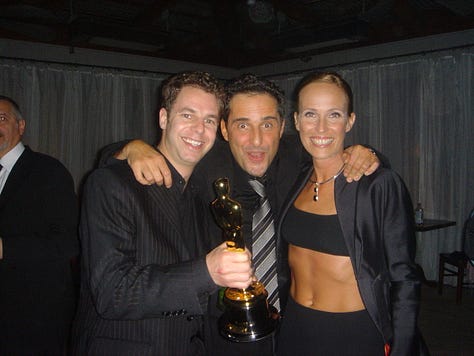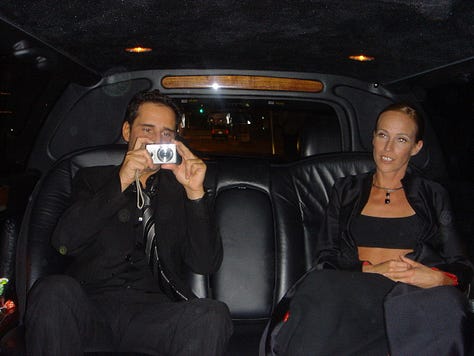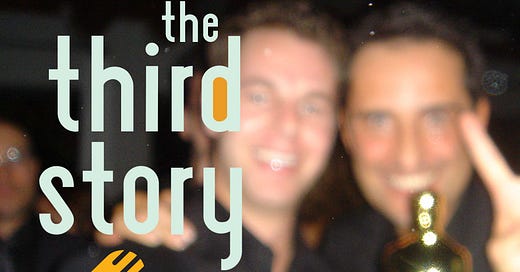Crossing the River: 20 Years After an Unexpected Oscar Win
20 years ago, Al otro lado del río became the first Spanish-language song to win an Oscar. Jorge Drexler & others revisit that moment, its impact, and how memory shapes history.
“Poetry always beats every other argument. In my experience, poetry moves people.” - Jorge Drexler
On Sunday night, "El Mal" from Amelia Perez won the Academy Award for Best Original Song. Unlike two decades ago, when a Spanish-language song winning in the category was considered a groundbreaking moment, this time, it felt natural—expected, even. The landscape has shifted, but that shift didn’t happen overnight. It happened slowly, and then all of a sudden.
Memory is a trickster. Even the moments we swear we remember clearly can shift when revisited from another angle. But some moments are undeniable. Take, for example, the time when a quiet, introspective song written and recorded in Madison, Wisconsin, by a Uruguayan singer-songwriter became the first Spanish-language song to win an Academy Award.
That song, “Al otro lado del río” was composed by Jorge Drexler for The Motorcycle Diaries, a film about a young Che Guevara’s transformative journey across South America. It was about movement, about crossing divides, about seeing a light on the other side. And its journey was just as unexpected as the song suggested.
Jorge wrote “Al otro lado del río” in a single session during the summer of 2003 while staying in Madison, where he and his family spent their summer vacations. He wrote it in the early morning after reading the film’s script, inspired by the imagery of a young Che Guevara crossing a river, the night before. The first take of the song—guitar and lead vocal—was recorded that same day in the house where he was staying, using a borrowed microphone. That take, raw and immediate, ended up being the foundation of the final track.
Later, more elements were added at Smart Studios (owned by Butch Vig and Steve Marker of the band Garbage). Then additional production—including the string arrangements, backing vocals, and programming—was done in the apartment of Jorge’s production partner in the project: me.
Playing through “Al otro lado del rio” with Jorge Drexler in 2003 at Smart Studios in Madison, WI.
The final recording was a mix of these different sessions, a testament to the organic, almost accidental nature of its creation.
When the Oscar nominations were announced, Jorge was as surprised as anyone. He had submitted the song himself after a helpful assistant at Focus Features suggested he mail in the paperwork, but had no expectations that it would even be considered. “Al otro lado del río” was nominated for Best Original Song, standing alongside tracks written by Hollywood legends. Many in the industry viewed his nomination as an aberration, something that could (and should) be corrected by a different outcome on Oscar night.
And then, against the odds, it won.
Jorge hadn’t been allowed to perform the song at the ceremony—producers deemed him too unknown, and Antonio Banderas, accompanied by Carlos Santana, performed it instead. It was an unusual pairing and a rather underwhelming rendition. But when Jorge walked onto the stage to collect his trophy (from Prince!), he made a quiet but resounding statement. Instead of delivering a traditional acceptance speech, he simply sang the song a cappella.
It was a moment that, in retrospect, felt both defiant and poetic. A song about crossing the river, sung by the very person who wasn’t allowed to sing it earlier that night, in a language that had never before won in this category. The Spanish-speaking world saw it as a revolutionary gesture. Hollywood saw it as an unexpected, perhaps elegant disruption.
In the immediate aftermath, Jorge’s career transformed. He went from a beloved but relatively underground singer-songwriter to an internationally celebrated artist. By 2024, Drexler had become a 15-time Latin Grammy winner, with three Song of the Year awards, solidifying his status as a leading figure in Latin music. For me, it was a surreal ride—one that first took my (now) wife Amanda and me from a friend’s basement watching the Oscars in sweatpants with Chinese takeout, almost immediately to the Vanity Fair afterparty, where we wandered among Hollywood royalty, still processing what had just happened.



It was also the impulse I needed to leave Madison and move to New York, setting me on a path that would ultimately lead to The Third Story podcast. In many ways, this project wouldn’t exist if it weren’t for that moment—one song, one night, and one unexpected win that reshaped my own trajectory.
In 2020 I recorded a version of the song, adapted into English as “Row On”.
This week as I reflected on all this, I decided to dive into the personal, musical, and deeper dimensions of that moment. In conversations with Jorge, Ana Laan, Amanda, and my dad, the story is revealed through multiple perspectives—how a small song became a big story, how a personal friendship turned into an historic artistic collaboration, and how an outsider’s win helped reshape the expectations of what belongs inside Hollywood’s biggest ceremonies.
In the process of putting it all together, I discovered that even though Jorge and I both remember that night vividly, our memories differ. He recalls me being in the limo with him on the way to the Oscars, and maintains that a conversation we had then was fundamental to the way he approached his winning speech. I am certain I was not there at that moment (though I am happy to take the credit). The memory trickster strikes again!
And ultimately, that's the point: the truth always lies in the cracks between the facts. In the end, every story is a mosaic of memories, perspectives, and contradictions. There’s your story, there’s my story, and then there’s the (ahem) Third Story.





